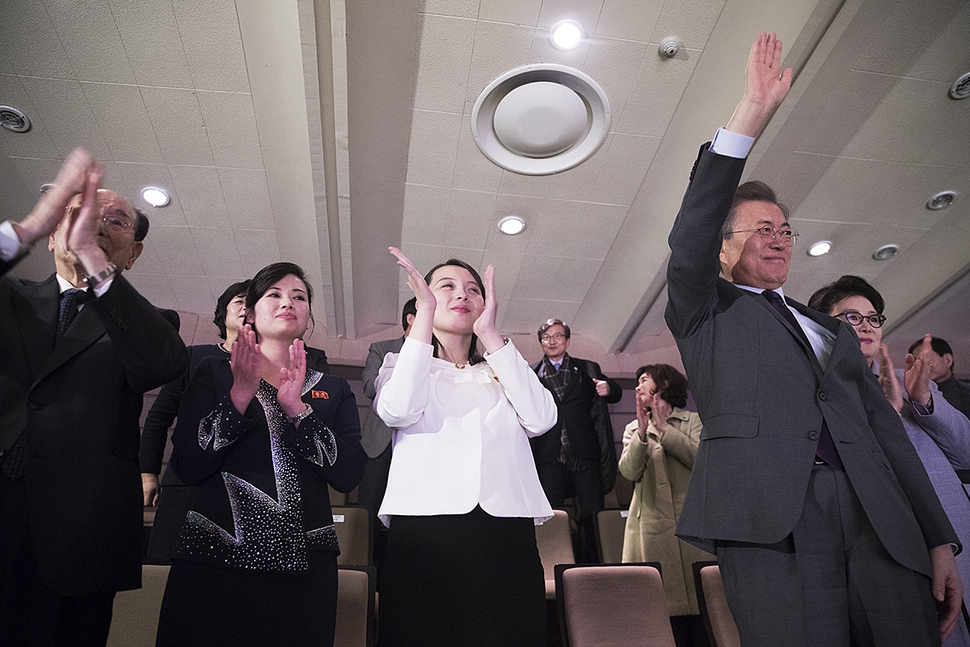Posted on : Mar.3,2018 15:20 KST
Modified on : Mar.3,2018 15:33 KST
 |
|
South Korean President Moon Jae-in, North Korean Central Committee first vice director Kim Yo-jong, and North Korean Samjiyon Orchestra director Hyon Song-wol applaud following the group’s performance at the National Theatre in Seoul on Feb. 11. (Yonhap News)
|
The Blue House has made official its plan to send a special envoy to North Korea in the near future. South Korean President Moon Jae-in told US President Donald Trump about the plan during a phone call on the evening of Mar. 1. Since the North sent special envoy Kim Yo-jong during the Pyeongchang Winter Olympics, there is nothing surprising about the South sending its own special envoy in return.
Given that South Korea-US joint military exercises are likely to resume in early April, after the Winter Paralympics in Pyeongchang, it is critical to send a special envoy to the North within the month to sustain the mood for dialogue. North Korea had Kim Yo-jong convey a proposal for an inter-Korean summit, so South Korea’s special envoy to the North should answer this proposal while also trying to facilitate North Korea-US dialogue. As long as North Korea-US dialogue is out of the question, any inter-Korean summit will surely be subject to clear limitations.
The Trump administration is stubbornly holding to its position that as long as denuclearization is not on the agenda, it will not take part in talks with North Korea. During the Pyeongchang Winter Olympics, the North was the first to propose contact with the US. Perceiving a simultaneous threat to its security and economy, the North apparently feels the need to find a way out through dialogue both with the South and with the US. In that case, North Korea and the US need to look for some point of contact on the nuclear and missile issues.
The North has already declared the completion of its state nuclear force, at the end of last year. That could mean that it does not need to carry out additional nuclear or missile tests. But North Korea also needs to make a greater effort to show its sincerity, perhaps by more specifically announcing a provisional halt to nuclear and missile tests as long as talks continue with the US and with South Korea.
South Korea’s special envoy needs to try to persuade the North Korean side along these lines. This will not be an easy task. Trading denuclearization for a security assurance is a deal that South Korea and the US have long offered the North, without achieving a breakthrough. We hope that the South will be in close communication with the US before the special envoy is detached to seriously discuss what can be done to reduce the security threat felt by the North Korean regime.
Prior to this, special envoys have frequently been sent to North Korea in secret, but this time the process is public. Considering that South Korea must shuttle between North Korea and the US to mediate between these mutually distrustful parties, openly sending a special envoy could actually help promote transparent discussion. South Korea must stay in close communication with the US to shore up bilateral trust while also taking steps to promote inter-Korean dialogue, exchange and cooperation. We hope that the special envoy to the North will keep alive the sparks of peace on the Korean Peninsula ignited by the Pyeongchang Winter Olympics.
Please direct questions or comments to [english@hani.co.kr]









